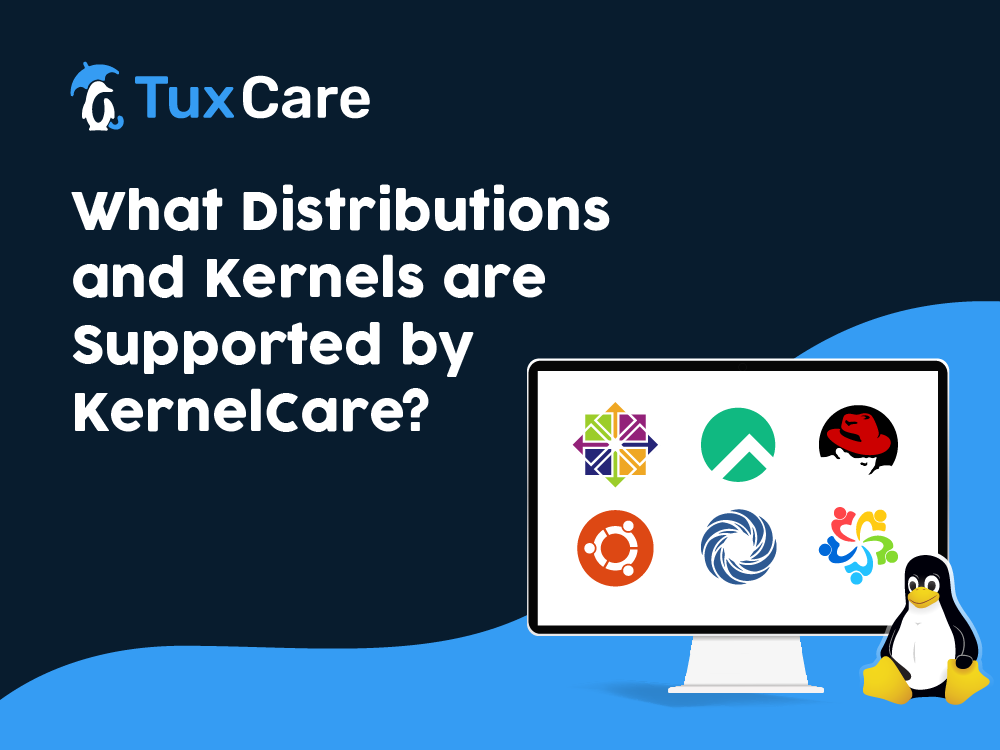What Distributions and Kernels are Supported by KernelCare?
KernelCare Enterprise is a fully automated live patching system designed to automatically patch vulnerabilities in the Linux kernel without system reboots, downtimes, or scheduled maintenance windows.
Several distributions and kernels are supported by KernelCare, which we will explore in this blog post – so that users can know its compatibility and benefits across different environments.
What Distributions Does KernelCare Support?
Some popular distributions supported by KernelCare Enterprise are as follows:
- Ubuntu
- CentOS
- RHEL
- Rocky Linux
- AlmaLinux
- Amazon Linux
- CloudLinux
- Debian
- Oracle Linux
- Raspberry PI OS
TuxCare’s KernelCare is fully compatible with these distributions and provides a comprehensive live patching solution for users to minimize the risk of vulnerabilities and enhance the overall security posture.
Moreover, TuxCare also provides Extended Lifecycle Support for CentOS 6, 7, and 8, as well as Ubuntu 16.04 and 18.04, and Oracle Linux 6, which includes vendor-grade security patches for additional years after the end-of-life date.
What Kernels Does KernelCare Support?
KernelCare supports a large number of kernel versions which include:
- 5.8 kernel series
- 5.14 kernel series
- 4.9 kernel series
- 4.4 kernel series
- 4.18 kernel series
- 4.15 kernel series
- 3.16 kernel series
- 3.13 kernel series
- 3.1 kernel series
- 2.6 kernel series
More information about supported distributions, kernels, as well as patches for them are available at patches.kernelcare.com.
However, you can find out whether KernelCare supports your kernel by running a simple Python script on your server, which is available on GitHub.
You can also execute that script directly by using one of the commands below:
curl -s -L https://kernelcare.com/checker | python
Or
wget -qq -O - https://kernelcare.com/checker | python
The output message will be:
COMPATIBLE: kernel supported by KernelCare
UNSUPPORTED: KernelCare doesn’t recognize the kernel
UNSUPPORTED; INSIDE CONTAINER: running inside the container, unable to patch the kernel
To discover more about KernelCare live patching, refer to this informative guide.
Which Kernels Are Development Kernels?
Linux kernels are available in two forms: stable and development. Stable kernels undergo comprehensive testing and receive the latest security updates and bug fixes. Their purpose is to establish a reliable and stable base for production environments.
On the other hand, development kernels are experimental releases that are not recommended for production environments, as they can lead to system crashes and potential security risks.
The kernel versions having -rc (6.4-rc6) are development kernels for testing purposes. The upcoming Linux kernel 6.4 is under development and looking for an expected release in late June or early July.
It is also important to understand the numbering system of the kernel versions. Each version number is divided into three parts with the help of periods. The first number indicates the major version, the second is the minor version, and the third is the revision or the patch number.
For example, if the Linux kernel version is 6.3.8, 6 is the major version, 3 is the minor version, and 8 is the patch level, indicating more patches have been fixed after the previous patch.
Final Thoughts
For organizations using CentOS, RHEL, Ubuntu, Debian, Oracle Linux, and many more, KernelCare offers live patching solutions across various distributions and kernels – helping your team put security patching on autopilot, minimize downtime, and dedicate more time toward other business-critical tasks.
For detailed information on Linux live patching without downtime, watch this webinar.



 Documentation
Documentation Login
Login



